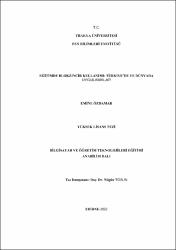Eğitimde blokzincir kullanımı : Türkiye'de ve dünyada uygulamalar
Özet
Bu çalışmanın temel amacı; eğitimde blokzincir teknolojisinin kullanımında
mevcut durumu, bu teknolojiden eğitim kurumlarının beklentilerini, kullanımın önündeki
engelleri, blokzincir teknolojisinin eğitimde kullanım oranını artırmak adına önerileri,
ilgili Türk ve yabancı akademisyenler ile Türkiye’deki ve yurt dışındaki kurum/firmaların
bakış açkısıyla ortaya koymaktır.
Çalışmanın araştırma sorularına yanıt aramak için, betimsel tarama modelinden
yararlanılmıştır. Blokzincir alanında çalışmaları olan ya da ders veren Türk ve yabancı
akademisyenlerle, Türkiye’de ve yurt dışında blokzincir alanında çalışmalar yürüten
firma ve kurumlar, çalışma grubunu oluşturmaktadır. Araştırma sorularına yanıt bulmak
için, çalışma grubundaki akademisyenlerle firma ve kurumlara yönelik olarak,
araştırmacı tarafından çoktan seçmeli ve açık uçlu sorulardan oluşan bir form
hazırlanmıştır. Soruların kapsam ve dil geçerliliği için uzman görüşleri alınarak, formlara
son şekilleri verilmiştir. Veri toplama araçları Survey Monkey uygulamasında
dijitalleştirilerek, katılımcılara e-posta yoluyla ulaştırılmıştır. Yanıtlar, Survey Monkey
veri tabanında toplanmıştır. Bu sayede, katılımcıların kimliği de gizli kalmıştır. Elde
edilen veriler SPSS 24 programıyla analiz edilmiştir.
Analizlerden elde dilen verilere göre; Türkiye’de ve yurt dışındaki üniversitelerde
blokzincir teknolojinin aktif olarak kullanım oranı düşüktür. Her iki gruptaki
akademisyenlerin yarısından fazlasının üniversitelerinde blokzincir teknolojisi ile ilgili
dersler okutulmaktadır. Yabancı üniversitelerdeki araştırma ve geliştirme (AR-GE)
çalışmalarının gerçekleştirilme oranının, Türk üniversitelerindeki çalışmalarla
karşılaştırıldığında daha yüksek olduğu görülmektedir. Türkiye’deki ve yurtdışındaki
üniversitelerden araştırmaya katılan akademisyenlerden özel sektör ile iş birliği
yapıldığını belirtenler, bu iş birliğinin en çok finans desteği almak olduğunu
belirtmişlerdir. Araştırmaya katılan Türk ve yabancı akademisyenlerin büyük bir
kısmının, blokzincir teknolojisinin üniversitelerde diploma ve eğitim sertifika
işlemlerinin kolaylaştırma ve güvenli kılma konusunda beklenti içinde olduğu
görülmektedir. Türkiye’deki akademisyenlerin çoğunluğu, üniversitelerinde blokzincir
kullanımının önündeki engel ya da sınırlılık olarak, kurumlarında bu teknolojiyi
geliştirecek yeterli sayıda ve donanıma sahip çalışan olmamasını belirtmişlerdir. Buna
karşılık, yurt dışındaki akademisyenlerin büyük bir kısmı, üniversite yöneticilerinin
blokzincir teknolojisiyle ilgili yeterli bilgiye sahip olmamasını engel ya da sınırlılık
olarak göstermiştir. Türkiye’de blokzincir teknolojisi alanında faaliyet yürüten
firma/kurumlardan sadece 2 tanesine ulaşılabilmiş, yurt dışındaki kurum/firmalardan
yanıt alınamamıştır. Katılımcı firma/kurumlar, üniversitelerin blokzincir teknolojisini
kullanmanın birçok yararı olacağı konusunda hemfikirdir. Firma ve kurumların ortak
görüşü; yeterli sayıda ve donanımda insan kaynağı bulunmaması, üniversite
yöneticilerinin blokzincir konusunda yeterli bilgi sahibi olmaması, üniversite öğrencileri,
akademisyenler ve diğer çalışanların, blokzincir kullanımı hakkında eğitim almamış
olması, üniversitelerde blokzincir teknolojisinin kullanımına engel ya da sınırlılık olarak
belirtilmiştir. Ayrıca bazı katılımcıların, eğitim kurumlarında blokzincir teknolojisinin
kullanımını artırmak ve bu teknolojinin geliştirilmesi için önerileri de, bu çalışmada yer
bulmuştur. The main purpose of this study; the aim is to present the current situation in the
use of blockchain technology in education, the expectations of educational institutions
from this technology, the obstacles to its use, suggestions to increase the use of blockchain
technology in education, from the perspective of relevant Turkish and foreign
academicians and institutions/firms in Turkey and abroad.
In order to find answers to the research questions of the study, the descriptive
survey model was used. The working group consists of Turkish and foreign academicians
working or giving lectures in the field of blockchain, and companies/institutions working
in the field of blockchain in Turkey and abroad. In order to find answers to the research
questions, a form consisting of multiple choice and open-ended questions was prepared
by the researcher for the academicians and companies/institutions in the study group. The
forms were finalized by taking expert opinions for the scope and language validity of the
questions. Data collection tools were digitized in the Survey Monkey application and
delivered to the participants via e-mail. Responses were collected in the Survey Monkey
database. In this way, the identity of the participants remained confidential. The data
obtained were analyzed with the SPSS 24 program.
According to the data obtained from the analysis; The active use of blockchain
technology in universities in Turkey and abroad is low. More than half of the
academicians in both groups teach courses on blockchain technology at their
universities. It is seen that the rate of research and development studies in foreign
universities is higher when compared to the studies in Turkish universities. Among the
academics participating in the research from universities in Turkey and abroad, those who
stated that they cooperated with the private sector stated that this cooperation was mostly
financial support. It is seen that most of the Turkish and foreign academicians
participating in the research are in expectation of blockchain technology to facilitate and
secure the diploma and education certificate processes in universities. The majority of
academics in Turkey stated that the obstacle or limitation of the use of blockchain in their
universities is the lack of sufficient number and equipment in their institutions to develop
this technology. On the other hand, most of the academicians abroad pointed out that
university administrators' lack of sufficient knowledge about blockchain technology is an
obstacle or limitation. Only 2 of the firms/institutions operating in the field of blockchain
technology in Turkey could be reached, and no response could be received from the
institutions/firms abroad. Participating companies/institutions agree that universities will
have many benefits from using blockchain technology. The common opinion of the
firm/institutions; The lack of sufficient and well-equipped human resources, the lack of
sufficient knowledge of university administrators about blockchain, the fact that
university students, academics and other employees have not received training on the use
of blockchain are stated as obstacles or limitations to the use of blockchain technology in
universities. In addition, some participants' suggestions to increase the use of blockchain
technology in educational institutions and to develop this technology were also included
in this study.
Koleksiyonlar
- Tez Koleksiyonu [1287]


















